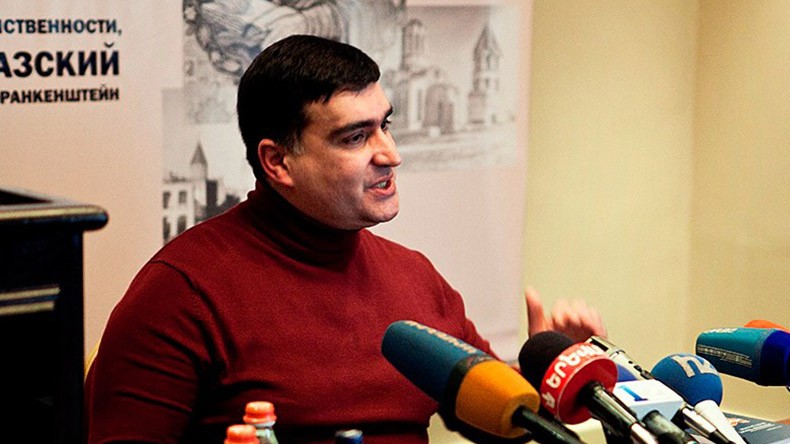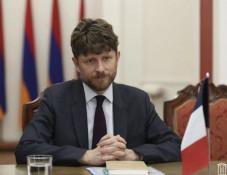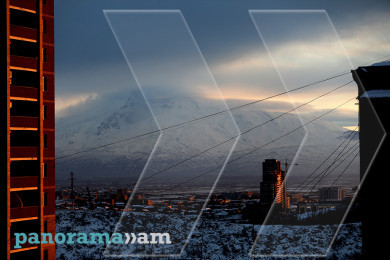
Aris Ghazinyan: According to orientalist Diakonoff's memories, most of Azerbaijani historians had “quite indirect relation” to science
Azerbaijani historiography is just one of the components of Pan-Turkic and Pan-Azerbaijani ideology, and it is necessary to research the history and philosophy of Pan-Turkic claims for a complex perception of the whole spectrum of encroachments on Armenian lands (and not only). Armenian journalist and researcher Aris Ghazinyan writes about it in the preface of his book “Yerevan: with a cross or on the cross,” which is an attempt of setting and considering an extremely diverse range of processes directly or indirectly forming the character of the development of the territory in question and predetermining the inevitability of turning Yerevan into the main center of the Eastern Armenia, and later on into the capital of the recovered Armenian state.
In his book, Ghazinyan covers the topic of the influence of the soviet school of historiography on the Azerbaijani one. “In order to understand the issue, it is necessary to initially be guided by the fact that the Bolsheviks were the founders of the Azerbaijan socialist nation. If the Pan-Turkic circles of the Young Turks established the Azerbaijan Democratic Republic at the end of the World War I, then the Bolsheviks modeled a nation of the same name in the second half of 1930s,” he writes, noting that it is especially important to consider that the priorities of foreign policy were not the last factors dictating this “quite painful” process of formation. Among such priorities, Ghazinyan mentions the phenomenon of contrasting Azerbaijanism to Pan-Turkism and of igniting the flame of the proletarian revolution further to the south, as a result of which the Turkic speaking Shia population of northern Iranian provinces was also adopted under a common socialistic ethnonym (“Azerbaijani”).
“With the emergence of a quite new nation on the Soviet map, the old aspiration of Bolsheviks to blow the flame of the proletarian revolution further to the south and to join the southern Persian provinces to the USSR fitted very comfortably in the context of ‘the necessity of a reunion of the split Azerbaijani nation in one republic.’ Such an argumentation was then presented as an important mechanism of resolving territorial issues,” the author writes.
Ghazinyan informs that the “transformation” into Azerbaijanis took place according to the following scheme: in the atmosphere of expectations for the near invasion of the Red Army in the southern Iranian provinces, the original directive anti-Turkic Azerbaijanism acquired new qualities and was condemned to transformation into anti-Iranian Pan-Azerbaijanism, which gradually departed from Pan-Sovietism in its progressive movement and entered into the orbit of Pan-Turkism (there were no essential differences in the understanding of their historical mission in the approaches of Pan-Turkists and Pan-Azerbaijanists: the formers proclaimed all the Turks their brothers, and the latter considered Shia Turks as such, calling them “Azerbaijanis”).
The speech of the head of the Azerbaijan SSR, Mir Jafar Baghirov, before sending soviet (Azerbaijani) agents to the southern Iranian provinces is quite significant: “The northern part of Iran is the Southern Azerbaijan. The biggest cities of Iran –Qazvin, Urmia, Mianeh, Maraga, Tabriz, Ardabil, Salmas, Khoy, Anzali, and others – are the motherland of our ancestors. And if you want to know the truth, Tehran is also an old Azerbaijani city.”
“Let us compare one Azerbaijani leader’s (Mir Jafar Baghirov) statement with that of another one (Heydar Aliyev). ‘The territory now called Armenia is the Western Azerbaijan. Irevan, Goycha, Zangibasar, Zangezur mahals were all places of inhabitance of Azerbaijanis. I believe in it, I believe that the owners of this land, the Muslims, the Azerbaijanis, will go back there’,” Ghazinyan writes callingthis the “true essence of Pan-Azerbaijanism.”
The formation of Soviet Azerbaijani school of historiography, especially its most radical direction, the Pan-Azerbaijanism, occurred at the boundary of 1930-1940s and was supported at the soviet level. In 1940s,it was necessary to simply rewrite scientific monographs, and new dissertations were not accepted at all, if they did not hide the most important – “the unity of the Azerbaijani nation”, “the aspiration to unite its separated parts,” Ghazinyan mentions.
“Joseph Stalin intended to stop the wave of Pan-Turkic moods increasing in the territory of the Azerbaijan SSR with the help of contrasting Azerbaijanism to Kemal Turkism, and at the same time to create ‘a moral justification’ for joining of the southern Iranian provinces,” he writes.
Ghazinyan also cites a senior researcher of the Institute of Ethnology and Anthropology at the Russian Academy of Sciences, Victor Schnirelmann, according to whom Azerbaijan “urgently needed its own history.” Since 1940-1941,a chair of Azerbaijani history worked at the Department of History of the ASU, and a course on Azerbaijani history was introduced, in which “Iranian and Armenian factors promoted the fast azerbaijanization of historical heroes and historical political institutions in the territory of Azerbaijan.”
The Stalin model of Pan-Azerbaijanism, originally a component of Pan-Sovietism, asserted its right to existafter the death of the “Father of Nations,” but already as a part of Pan-Turkism, year by year entering more persistently into the ideological frames designated by the founders of the Azerbaijan Democratic Republic, i. e., the Young Turks and Musavat followers.
“This was when the process of deposing Armenian personnel from state institutions kicked off. Simultaneously, a collection of 'perspective historians' was carried out, who were called to process, describe, and input 'a past of the nation' in the collective consciousness. In 1954, Ziya Bunyadov, a future falsifier of regional history and loud-hailer of armenophobia, began working as a senior researcher in the Institute of History of ANAS of Azerbaijan SSR (before that, he had beenspecialized in other theme, ‘Italian Imperialism in Africa’),” Ghazinyan writes.
Memories of the famous orientalist Igor Diakonoff are also introduced in the book. Diakonoff shares his impressions of communication with Azerbaijani historians, most of them having“quite indirect relation” tothe science; they were “party members thrown at the science” and were engaged in“eating each other.”As for Bunyadov, Diakonoff writes: “There was a Hero of the Soviet Union, an arabist later famous for the scientific publication of a medieval historical Arabian or Iranian source, from which, however, all the references about the Armenians were thoroughly removed.”
“This very contingent was called to 'scientifically prove' the Turkic autochthony in the region and seek out 'proofs' of their decisive contribution to the process of formation of ancient states. At the same time, the ineffectiveness and vulnerability of these people’s professionalism and competence were clearly realized, that is why 'specialists from the center' were invited to work. Diakonoff remembers how he was called to ‘prove that the ancient Iranian kingdom of Media belonged to Azerbaijan',” Ghazinyan informs.
Ghazinyan also cites the comment of the dean of the Department of Oriental Studies of Saint Petersburg University, a fellow of RAS (Russian Academy of Sciences) Ivan Steblin-Kamensky, who confesses that they prepared specialists in “newly formed states.” However, “they are abundant withnationalistic tendencies and scientific falsifications.”“There is no objective approach to the history and the course of historical development in their works.Sometimes there is an open falsification. For example, Nizami, a monument to whom is raised in Kamennoostrovsky Prospekt, is declared a great Azerbaijani poet <…>and it is proved by the fact that he lived in the territory of modern Azerbaijan,” Ghazinyan cites the scientist.
Regarding the given problems, comments of Victor Schnirelmann found a place in Ghazinyan's book. “Another means of eliminating the Armenian presence in the ancient and medieval Transcaucasia and of belittling their role is the republishing of antique and medieval sources with notes, with the replacement of the term 'Armenian State' by 'Albanian State' or with other distortions of the original texts. From 1960s to 1990s, numerous republished sources of the kind appeared in Baku, and academician Bunyadov was actively involved in the process<…> Renaming medieval Armenian politicians, historians, and writers, who had lived and worked in Karabakh, into Albaniansbecame the favorite occupation of the Azerbaijani authors. <…>Bunyadov’swriting, where all this became a basic position, was the most influential book in Azerbaijan <…> and it was dedicated to events of Arabian times in the Caucasian Albania, which he directly named Azerbaijan. He already writes about 'Armenian speaking authors' in this book, implying early medieval Albanian figures, who wrote in Armenian <…> Bunyadov writes about a rich Albanian literature, which did not reach to us, being allegedly destroyed by the efforts of the Arabs and Armenians. At the same time, the Armenians allegedly translated Albanian manuscripts into grabar, consciously distorting the original Albanian texts,” the author cites Victor Schnirelmann as writing.
Heyar Aliyev’smourning speech on the second day after Bunyadov's death is significant in this context; he said: “He was one of the most outstanding scientists, one of the most outstanding historians and one of the most outstanding representatives of our nation in XX century. I think he will be spoken about more after this, books and memoirs will be written about him <…> I repeat that this is the person our nation gave to the world as a gift in XX century <…> He relied on original sources, referred to them and used them in science and in his searches.”
Actually, Bunyadov wrote about Yerevan in his malicious appeal to the Armenians: “You invented the 2750th anniversary of Yerevan, though even pupils know that as a settlement,Yerevan (the future capital of Azerbaijani khanate)appeared in XVI century.” Therefore, this “Pan-Turkic colossus of scientific source studies” processed in the Soviet period denies even the idea of medieval Yerevan's existence, ignoring the original sources, Ghazinyan writes.He notes that such a policy towards Yerevan (and towards the Armenian state as a whole) is also backed by biased people outside the Azerbaijan Republic. In particular, representatives of several countries are involved in the process and support Pan-Turkic or Pan-Islamic point of view.
To be contined.
Aris Ghazinyan’s “Yerevan: with a cross or on the cross” is a book about the social and political history of Yerevan and Yerevan district (as a habitat) since the declaration of Christianity to the beginning of XIX century. In addition to demonstrating historical facts based on archive documents and sources, the book also considers the fundamental theses of the Azerbaijani historiography and Pan-Turkic ideology aimed at appropriating the historical, cultural, and spiritual heritage of the Armenians and other nations of the region by falsifying their history.
Related news
- Aris Ghazinyan: Past and future in Azerbaijan are modeled upon decrees and program speeches of president
- ‘Polygon Azerbaijan’: Azerbaijan’s true history ‘in context of global political processes’
Newsfeed
Videos






























